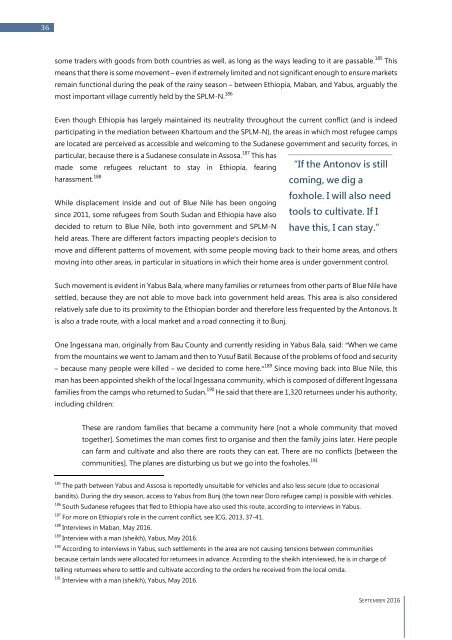A Crisis Normalised
2ctogG9
2ctogG9
You also want an ePaper? Increase the reach of your titles
YUMPU automatically turns print PDFs into web optimized ePapers that Google loves.
36 <br />
<br />
some traders with goods from both countries as well, as long as the ways leading to it are passable. 185 This<br />
means that there is some movement – even if extremely limited and not significant enough to ensure markets<br />
remain functional during the peak of the rainy season – between Ethiopia, Maban, and Yabus, arguably the<br />
most important village currently held by the SPLM-N. 186<br />
Even though Ethiopia has largely maintained its neutrality throughout the current conflict (and is indeed<br />
participating in the mediation between Khartoum and the SPLM-N), the areas in which most refugee camps<br />
are located are perceived as accessible and welcoming to the Sudanese government and security forces, in<br />
particular, because there is a Sudanese consulate in Assosa. 187 This has<br />
made some refugees reluctant to stay in Ethiopia, fearing<br />
harassment. 188<br />
While displacement inside and out of Blue Nile has been ongoing<br />
since 2011, some refugees from South Sudan and Ethiopia have also<br />
decided to return to Blue Nile, both into government and SPLM-N<br />
held areas. There are different factors impacting people’s decision to<br />
“If the Antonov is still<br />
coming, we dig a<br />
foxhole. I will also need<br />
tools to cultivate. If I<br />
have this, I can stay.”<br />
move and different patterns of movement, with some people moving back to their home areas, and others<br />
moving into other areas, in particular in situations in which their home area is under government control.<br />
Such movement is evident in Yabus Bala, where many families or returnees from other parts of Blue Nile have<br />
settled, because they are not able to move back into government held areas. This area is also considered<br />
relatively safe due to its proximity to the Ethiopian border and therefore less frequented by the Antonovs. It<br />
is also a trade route, with a local market and a road connecting it to Bunj.<br />
One Ingessana man, originally from Bau County and currently residing in Yabus Bala, said: “When we came<br />
from the mountains we went to Jamam and then to Yusuf Batil. Because of the problems of food and security<br />
– because many people were killed – we decided to come here.” 189 Since moving back into Blue Nile, this<br />
man has been appointed sheikh of the local Ingessana community, which is composed of different Ingessana<br />
families from the camps who returned to Sudan. 190 He said that there are 1,320 returnees under his authority,<br />
including children:<br />
These are random families that became a community here [not a whole community that moved<br />
together]. Sometimes the man comes first to organise and then the family joins later. Here people<br />
can farm and cultivate and also there are roots they can eat. There are no conflicts [between the<br />
communities]. The planes are disturbing us but we go into the foxholes. 191<br />
185<br />
The path between Yabus and Assosa is reportedly unsuitable for vehicles and also less secure (due to occasional<br />
bandits). During the dry season, access to Yabus from Bunj (the town near Doro refugee camp) is possible with vehicles.<br />
186<br />
South Sudanese refugees that fled to Ethiopia have also used this route, according to interviews in Yabus.<br />
187<br />
For more on Ethiopia’s role in the current conflict, see ICG, 2013, 37-41.<br />
188<br />
Interviews in Maban, May 2016.<br />
189<br />
Interview with a man (sheikh), Yabus, May 2016.<br />
190<br />
According to interviews in Yabus, such settlements in the area are not causing tensions between communities<br />
because certain lands were allocated for returnees in advance. According to the sheikh interviewed, he is in charge of<br />
telling returnees where to settle and cultivate according to the orders he received from the local omda.<br />
191<br />
Interview with a man (sheikh), Yabus, May 2016.<br />
SEPTEMBER 2016


